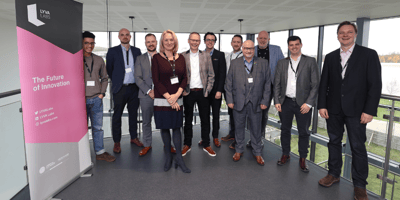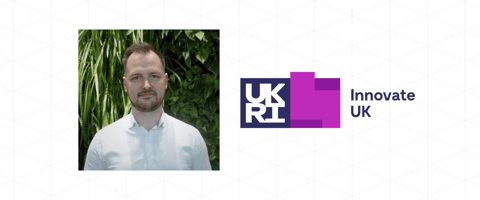Photo, l-r Tom Johnston, Operations Director, Arete Zero Carbon; Francis Wight, Investment Manager,...
How does LYVA Labs help deliver the LCR Innovation Prospectus’ ambition?
Liverpool City Region (LCR) has set itself some ambitious targets for research and development (R&D) spending by 2030 – 5% gross value added (GVA), which is double the UK target.
Far from being an aspiration, with little chance of realisation, this forecast is based on an existing £3bn pipeline of projects and a growing cluster of health and life sciences/infection control, advanced manufacturing/ materials chemistry, emerging technologies, and net zero/ smart city innovations in the city region.1
LCR also has a strong network of science, innovation, and industrial assets, of national and global importance: Liverpool School of Tropical Medicine and iiCON; the University of Liverpool’s Materials Innovation Factory; Hartree National Centre for Digital Innovation; Daresbury Science and Technology Park; and Glass Futures, in St Helens.
So how do you capitalise on this wealth of academic research and development (R&D), real-world science/technology innovation, and an industrial network primed to commercialise great ideas, whilst driving sustainable investment, growth, and jobs?
LCR unveiled a multi-billion-pound innovation plan and accompanying innovation prospectus, to help realise Liverpool’s ambitions of becoming the ‘UK’s science superpower’. The innovation prospectus helped LCR to gain investment backing from central government and to highlight the wealth of opportunities available to investors or companies looking to relocate to or partner with the region.
But with many strands to this growing ecosystem, LCR needed mechanisms to harness the brilliance and extend real growth opportunities to SMEs and innovative businesses across the region. In 2022 LYVA Labs launched, with a £7.5m grant from Metro Mayor, Steve Rotheram, and the job of joining some of the dots and pulling together strands of innovation, R&D, investment opportunities, and assets.
LYVA Labs has subsequently invested £531,000 in three innovative companies and helped four more companies secure a total of £1.8m from other sources. We’ve also been awarded £3m2 to set up our Innovation Partner consultancy service, with the aim of strengthening collaboration across the LCR innovation ecosystem and supporting SMEs and larger organisations with tools, knowledge, investment, partnerships, and access to assets they need to commercialise new products and services.
Here, LYVA Labs’ Innovation Partner consultancy team explains how the work they do is helping to deliver LCR’s innovation aspirations.
Q 1. What is the Innovation Partner Consultancy service and what can you offer to SMEs and larger organisations looking to innovate, grow, and secure funding?
Our team connects ideas, people, and assets to drive innovation-led business growth across Liverpool City Region, applying innovation expertise gained during many years in industry with blue-chip companies.
We help businesses to explore new opportunities through guided strategy and ideation workshops. We also build partnerships with subject matter experts and help signpost businesses to resources and investments that enable them to develop new products and service ideas – moving them closer to commercialisation.
We can also provide small kick-starter grants for the ideas that have the strongest potential for growth and jobs in the region.
Q 2. Who is eligible to apply for support from the consultancy and how can you help with business model and ideation development?
Liverpool City Region (LCR) based businesses, large or small, are encouraged to contact us for advice and support in bringing product and service ideas to market or help to define their business’ overall approach to innovation.
We’re open to any sector and are looking for ambitious, established businesses that are looking for innovation-led growth, or research-led spinouts and start-ups that are seeking new commercial collaborations.
We want to find business leaders with innovative ideas and technologies, and answers to real-world challenges that can help fuel future growth for our region.
Q 3. Where do you think there have previously been barriers to commercialisation and innovation growth for SMEs and organisations in LCR?
Having worked with and for SMEs in the region, and in marketing and research and development (R&D) teams in larger corporations, our view is that the barriers to innovation often come down to the same three constraints of time, money, and expertise.
- How can I secure time for me or my team to explore new ideas?
- How can I fund these new ideas without damaging our bottom line?
- How can I find the right expertise to bring these new ideas to market?
Our Innovation Partner service is built to help address each of these three constraints. Our time is fully funded and structured as a co-development partnership to quickly explore, identify and develop high potential ideas. We have small kick-starter grants to help reduce risk and initial costs to businesses. And we have a team with diverse sector experience and connections into our knowledge assets – so the right expertise is always available when required.
Q 4. Part of your work is around connecting businesses with assets, academic and knowledge partners, and industrial networks. Why is it important to encourage collaboration between these different sectors?
We believe in the power of open innovation, where organisations do not rely solely on internal resources and capabilities but seek ideas and knowledge from external sources. Customers, partners, and external experts can help organisations discover new opportunities that accelerate their innovation and growth.
Organisations that embrace open innovation and prioritise strong ecosystem engagement have a 58% revenue growth rate premium over organisations that pursue open innovation alone3. So, a core part of our mission is to ensure that businesses and knowledge assets, with shared interests and ambitions, are building new partnerships and seeing those benefits.
Q 5. Both central government and LCR have placed innovation investment at the heart of their priorities for driving economic growth and supporting the levelling-up agenda. Why is innovation so integral to sustainable economic growth?
Innovation should be integral to our regional economy if it is to be competitive and deliver sustained growth that can impact lives and livelihoods. Innovation delivers multiple benefits for our economy’s businesses and organisations; it also increases productivity, attracts new investment, enhances market competitiveness, and creates new high-skilled jobs for the region.
Mayor Steve Rotherham’s target to invest 5% GVA into research and development – nearly double the government’s national targets – will help drive LCR’s mission of becoming the country’s innovation engine.
Q 6. LCR has some clusters of expertise, around science and innovation, what are they and why is it important to identify and fortify these clusters?
As outlined in the refreshed Innovation Prospectus, LCR is home to three world-leading specialisms in infection prevention and control, materials chemistry, AI solutions, emerging technologies, and net zero projects. These assets can help us lead the ‘green industrial revolution.’
Highlighting these strengths in an overarching regional innovation strategy enables investors and policymakers to prioritise our region for growth in these sectors. It also helps the regional business community to see what capabilities they can leverage into their organisations to develop innovative new products and services.
Q 7. Where do you think the consultancy work you do can add value to the strengthening of LCR’s presence as a ‘science super cluster’?
Our services support businesses that want to innovate but need initial guidance and connections to help them realise their ambitions. Building on the work of the innovation prospectus, we will highlight knowledge assets in the region and help establish new business partnerships.
Creating purposeful connections will help us to deliver more high-return innovations that help to cement LCR’s reputation as a science super cluster.
Q 8. What would success look like for your Innovation Partner service?
Our mission is to connect ideas, people, and assets, to drive future growth across Liverpool City Region. We want to scope 50+ new innovative ideas in the next five years, with 25 receiving kick-start grants from us. We want to move 15 projects towards commercialisation or further funding, with support from LYVA Labs.
Our ambition is to ensure that LCR is receiving its fair share of Innovate UK grant funding. LCR broadly has the same success rate to other regions in Innovate UK grant competitions, but the number of applications is lower than national averages, as is the average level of grant funding being sought. By helping to develop new innovative ideas with businesses, we hope to positively shift these statistics. SMEs that received Innovate UK funding, on average, grew their turnover by £5 million to £10 million, and employment by 30 to 40 employees, after 2 to 4 years, compared to similar companies not supported by Innovate UK4.
1Quotes and numbers from LCR’s Innovation Prospectus
2Taken from LYVA Labs’ annual report.
3Source: IBM Institute for Business Value - Open the door to open innovation 2022
4Source – Finding the true value of investing in innovation – UKRI, Oct 22.



